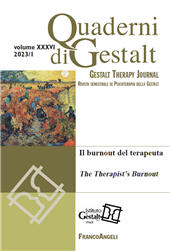Il diritto e la responsabilità di prendersi cura di sé in uno sfondo post-pandemico
51-60 p.
L'articolo delinea la relazione terapeutica in ottica gestaltica, evidenziando il ruolo dello psicoterapeuta nelle sue capacità e nei suoi limiti. L'obiettivo dell'articolo è quello di evidenzia-re il declinarsi delle varie competenze a cui lo psicoterapeuta attinge nella propria professione, sottolineando l'importanza del prendersi cura di sé, di cui lo psicoterapeuta ha il diritto e la re-sponsabilità di fronte ai propri pazienti. Il contesto storico-sociale degli ultimi anni e quello contemporaneo, nel quale la pandemia da COVID-19 ha assunto particolare rilevanza, sollecitano a rinnovare le modalità del prendersi cura di sé, che trova la miglior forma nello spazio di supervisione individuale e di gruppo e nel percorso di psicoterapia personale.
Tali spazi si con-figurano come uno sfondo comune da cui emergono figure in un processo di costante co-costruzione e che, proprio per questo, diventano, per il singolo psicoterapeuta partecipe, un luogo di incontro, dialogo, apprendimento e trasformazione. [Testo dell'editore].
The authors highlight the therapeutic relationship from a Gestalt point of view, describing the role of the psychotherapist in his abilities and limitations. The Gestalt perspective places the patient and the therapist at the center of the psychotherapeutic process as human beings who meet at the contact boundary and co-create the experiential field. Therefore, the Gestalt perspective urges the psychotherapist to maintain an integrated vision also in the gaze he directs at himself, inviting him to take care of himself. The aim of the article is to emphasize the decline of the various skills that the psychothera-pist draws on in his profession, underlining the importance of taking care of himself, because the psychotherapist has the right and the responsibility towards his patients. Being psychotherapists at the time of COVID-19, therefore, has allowed us to obtain a great heritage or to welcome our fragility and human fallibility.
Our fear of meeting patients keeping the right distance, so as to be able at the same time to help them, has continually implied adapting to a precarious ground leaning on our resilience, keeping one's senses open to continue offering the support, though unstable, keeping alive our desire to meet the other even if in different ways than in the past, to support patients in a depressed and repeatedly scary field. The historical-social context of recent years and the contemporary one call for a renewal in the ways of taking care of oneself, which finds the best solution in the individual and group supervision and in the personal psychotherapy. These spaces are a common background from which figures emerge in a process of constant co-construction and which, for this reason, be-come a place of meeting, dialogue, learning and transformation for the single psychotherapist. [Publisher's text].
-
Articles from the same issue (available individually)
-
Information
ISSN: 2035-6994
KEYWORDS
- Cura di sé, confine di contatto, gruppo di supervisione, competenze dello psicoterapeuta, essere fallibile
- Selfcare, contact boundary, supervisory group, psychotherapist skills, being fallible


